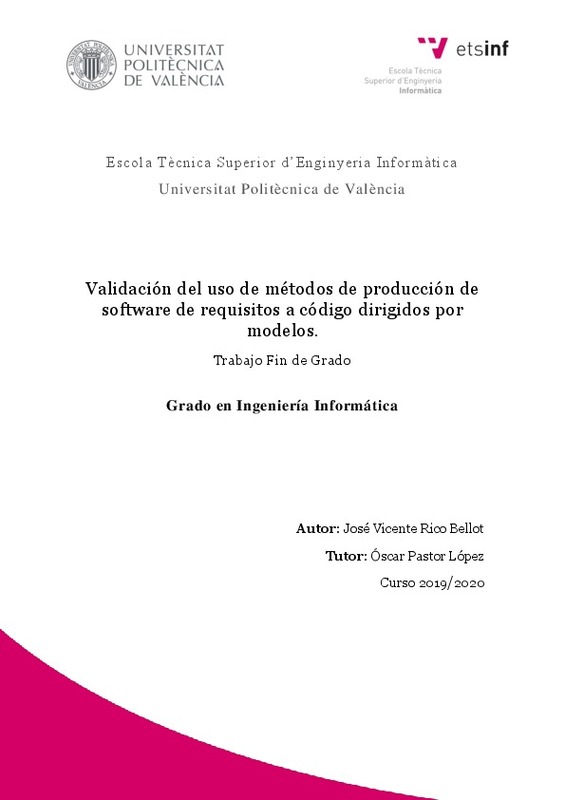JavaScript is disabled for your browser. Some features of this site may not work without it.
Buscar en RiuNet
Listar
Mi cuenta
Estadísticas
Ayuda RiuNet
Admin. UPV
Validación del uso de métodos de producción de software de requisitos a código dirigidos por modelos
Mostrar el registro sencillo del ítem
Ficheros en el ítem
| dc.contributor.advisor | Pastor López, Oscar
|
es_ES |
| dc.contributor.author | Rico Bellot, José Vicente
|
es_ES |
| dc.date.accessioned | 2020-10-22T12:02:28Z | |
| dc.date.available | 2020-10-22T12:02:28Z | |
| dc.date.created | 2020-09-16 | |
| dc.date.issued | 2020-10-22 | es_ES |
| dc.identifier.uri | http://hdl.handle.net/10251/152874 | |
| dc.description.abstract | [ES] Esta tesis pretende estudiar y analizar las herramientas Great (Ruiz, 2018) e IntegraNova (IntegraNova, 2020) y la viabilidad del uso de ambas como forma de producir software. El método de producción se basa en modelos conceptuales de requisitos usando el método de Análisis Comunicacional, y en su transformación a un esquema conceptual del sistema siguiendo el OO-METHOD, para finalmente generar el código del software en forma automática. Para ello se realizará un estudio del funcionamiento de las tecnologías en las que se basan Análisis Comunicacional (GREAT) y OO-Method (IntegraNova) con su documentación plasmada en esta tesis. Tras aportar la documentación de las tecnologías y las herramientas se procederá a realiaar un caso de uso práctico que constará de un ejemplo guiado en el que se partirá de un sistema de información real, el cual será modelado con Great en análisis comunicacional y se realizará el proceso de transformaciones pertinente hasta llegar a convertirlo en el código equivalente que sirva para poder manejar ese sistema de información. Todo este proceso será documentado en detalle, ayudando a la comunidad de modelamiento a tener esta documentación disponible para cuando quieran investigar el funcionamiento de las herramientas, debido a que son herramientas experimentales y no constan de demasiada información sobre ellas. Al final de la tesis se evaluarán los resultados obtenidos en las diferentes fases del proyecto y se realizarán unas valoraciones para reflejar cuales son los problemas y las oportunidades que nos ofrece esta forma de producir código ante las formas de programar tradicionales. | es_ES |
| dc.description.abstract | [EN] This thesis aims to study and analyze the Great (Ruiz, 2018) and IntegraNova (IntegraNova, 2020) tools and the feasibility of using both as a way of producing software. The production method is based on conceptual models of requirements using the Communicational Analysis method, and on its transformation to a conceptual scheme of the system following the OO-METHOD, to finally generate the software code automatically. To this end, a study of the operation of the technologies on which Communicational Analysis (GREAT) and OO-Method (IntegraNova) are based will be carried out with its documentation reflected in this thesis. After providing the documentation of the technologies and tools, a practical use case will be carried out that will consist of a guided example that will start from a real information system, which will be modeled with Great in communication analysis and the process of pertinent transformations until it is converted into the equivalent code that is used to be able to manage that information system. This entire process will be documented in detail, helping the modeling community to have this documentation available for when they want to investigate the operation of the tools, since they are experimental tools and do not contain much information about them. At the end of the thesis, the results obtained in the different phases of the project will be evaluated and some evaluations will be made to reflect what are the problems and opportunities that this way of producing code offers us compared to the traditional ways of programming. | es_ES |
| dc.format.extent | 78 | es_ES |
| dc.language | Español | es_ES |
| dc.publisher | Universitat Politècnica de València | es_ES |
| dc.rights | Reserva de todos los derechos | es_ES |
| dc.subject | Desarrollo Dirigido por Modelos | es_ES |
| dc.subject | Modelado Conceptual | es_ES |
| dc.subject | Ingeniería de Sistemas de Información. | es_ES |
| dc.subject | Model-driven development (MDD) | es_ES |
| dc.subject | Conceptual modeling | es_ES |
| dc.subject | Análisis comunicacional | es_ES |
| dc.subject | OO-Method | es_ES |
| dc.subject | Software dirigido por modelos | es_ES |
| dc.subject | Great | es_ES |
| dc.subject | IntegraNova | es_ES |
| dc.subject | Communicational Analysis | es_ES |
| dc.subject | Model Driven Software | es_ES |
| dc.subject | Information Systems Engineering | es_ES |
| dc.subject.classification | LENGUAJES Y SISTEMAS INFORMATICOS | es_ES |
| dc.subject.other | Grado en Ingeniería Informática-Grau en Enginyeria Informàtica | es_ES |
| dc.title | Validación del uso de métodos de producción de software de requisitos a código dirigidos por modelos | es_ES |
| dc.type | Proyecto/Trabajo fin de carrera/grado | es_ES |
| dc.rights.accessRights | Abierto | es_ES |
| dc.contributor.affiliation | Universitat Politècnica de València. Departamento de Sistemas Informáticos y Computación - Departament de Sistemes Informàtics i Computació | es_ES |
| dc.contributor.affiliation | Universitat Politècnica de València. Escola Tècnica Superior d'Enginyeria Informàtica | es_ES |
| dc.description.bibliographicCitation | Rico Bellot, JV. (2020). Validación del uso de métodos de producción de software de requisitos a código dirigidos por modelos. http://hdl.handle.net/10251/152874 | es_ES |
| dc.description.accrualMethod | TFGM | es_ES |
| dc.relation.pasarela | TFGM\129269 | es_ES |
Este ítem aparece en la(s) siguiente(s) colección(ones)
-
ETSINF - Trabajos académicos [5160]
Escola Tècnica Superior d'Enginyeria Informàtica






